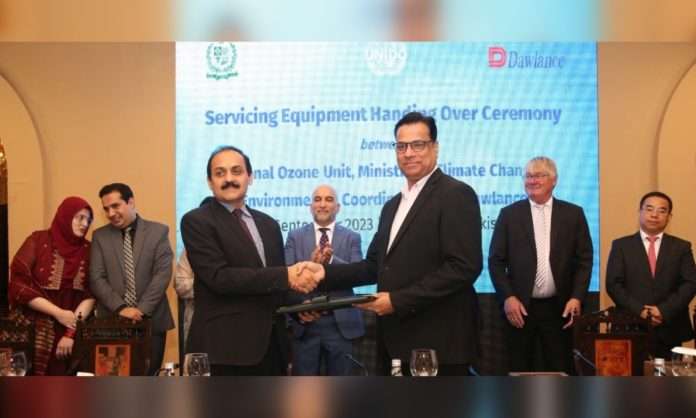The top manufacturer of home appliances in Pakistan, Dawlance, uses the environmentally friendly refrigerant gas R 32 in all of its products to cut down on emissions and prevent the deterioration of the ozone layer, a thin layer of gas that shields the Earth from the sun’s harmful rays. The “United Nations Industrial Development Organisation” (UNIDO) recently gave specialised equipment to Dawlance for recycling the R-32 refrigerant with the aim of reducing the unsafe disposal of these gases in the atmosphere.
The recycling equipment was recently given over in a colourful ceremony at a gathering in Islamabad. “As a socially responsible enterprise, we understand the critical importance of using planet-friendly refrigerants and recycling the gases safely and responsibly to preserve the ozone layer,” Dawlance’s Chief Marketing Officer, Syed Hasan Jameel, said in his remarks.
Dawlance’s philosophy of “progress today, preserve tomorrow” is clearly reflected in this environmental initiative because it ensures long-term sustainability and a bright future for people. In addition to agreeing to train 1000 technicians and installers in the proper handling of the R-32 refrigerant, UNIDO has given Dawlance 100 gas-recovery units that will be used all throughout Pakistan.
Dawlance will recycle and use the R-32 refrigerant, which is renowned for having a negligible impact on the environment and is based on more cutting-edge technologies. After switching to R-32 refrigerant, Dawlance was given an “Ozone and Environmental-Friendly Technology Award” by the NOU Ministry of Climate Change. Other conventional industries must also be motivated by this initiative in order to safeguard the ozone layer and the security and wellbeing of the environment.
Dawlance wants to cut its carbon dioxide emissions and discharge by almost 5000 kg (275 metric tonnes). Additionally, it will recycle, reprocess, and reuse R-32 refrigerants to lessen the need to create these dangerous gases. The SBTi’s “2°C scenario” aims for a 15% reduction in GHG emissions by 2030 starting from base year 2018, while the “1.5°C scenario” aims for a 50% reduction by 2030. the emissions brought on by the use of solid products.
Dawlance is making history with this two-pronged approach while also raising public awareness of the negative effects of releasing refrigerant into the atmosphere. In order to ensure sustainable socioeconomic growth, Dawlance is also implementing other international best practices.










